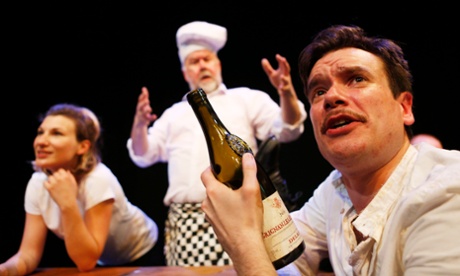
Eric Blair became George Orwell during his time in Paris in the late 1920s, transformed from a public school-educated young man who liked the idea of being a poet, but who had “nothing to say”, into a political writer. Blair was a man blinded by his own privilege; Orwell observed that the poor are all around us and getting poorer every day.
David Byrne’s often funny, nuanced play, which he has co-directed with Kate Stanley, is not a simple adaptation of Orwell’s 1933 book of the same name, in which the writer explored poverty in the two cities. The London in the title refers not to the capital in the late 1920s but in the 21st century, as depicted in Polly Toynbee’s 2003 book, Hard Work, for which she, like Orwell, went and lived among the poor. For Orwell it was a flop house in Paris; for Toynbee it was social housing, negotiating the benefits system and working in minimum wage jobs on zero-hours contracts. The piece doesn’t shirk the fact that in both cases these writers were mere visitors to these worlds. Toynbee points out that she can see the tower block where she goes to live temporarily from her own back garden.
On stage, the books become cunningly entwined, reflecting back and forth on each other in a staging where the past and the present seem in constant conversation. When Orwell, in the 1920s, expresses his astonishment that he has never previously noticed the poor all around him, the show switches to Toynbee working in the modern day as a porter in the NHS. She approaches a consultant who, in her job as a Guardian journalist, she has interviewed four times and gone for lunch with twice. The consultant brushes her aside: she is rendered invisible by her uniform and lowly status.
Neatly performed by the ensemble, this show feels constrained by its one-hour format. It needs more of an opportunity to breathe as it turns statistics (a single bed bought on the high street might cost you £200, but one bought on credit could end up costing more than £850) into human stories and lives lived. As we go about our business the poor are always “just a wall away” observes Toynbee. As austerity bites and social mobility lessens, that barrier grows more impenetrable by the day.
- At Pleasance Courtyard, Edinburgh, until 31 August. Box office: 0131-226 0000.

